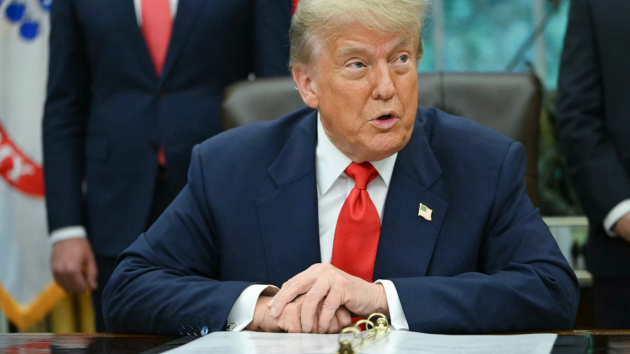
(WASHINGTON) — President Donald Trump on Monday lifted U.S. sanctions on Syria, signing an executive order to carry out a promise he made in May.
White House press secretary Karoline Leavitt told reporters ahead of the signing that Trump’s action was designed to “promote and support the country’s path to stability and peace.”
When he met with Syria’s new president Ahmad al-Sharaa last month, Trump announced he would lift the crippling U.S. sanctions against Syria and urged al-Sharaa to meet specified conditions in hopes that it will stabilize the country.
Those conditions included normalizing relations with Syria’s neighbors, including Israel, as well as the United States.
Ahmad al-Sharaa is a former al-Qaeda insurgent who fought against U.S. forces in Iraq and served time in the infamous Abu Ghraib priso.
Senior Trump administration officials who previewed the president’s action terminating the Syria sanctions program said it would dismantle the architecture of the program established by the executive branch while maintaining provisions targeted at Bashar Al Assad, his collaborators, and other destabilizing forces still at work in the region.
U.S. Ambassador to Turkey and the administration’s Special Envoy for Syria Tom Barrack cast the executive order — which is intended to work in tandem with the general waiver significantly easing sanctions that was issued by the U.S. in May — as a move by the president to “give these guys a chance,” referring to Syria’s interim government.
“You have a general who transitioned from wartime into a position of being the leader of a reframed new country that needs everything, and that’s basically what’s happened, but the vision and the execution was limited by our imposition of sanctions,” he said. “Syria needs to be given a chance, and that’s what’s happened.”
Barrack also said the purpose driving Trump was not to hold leverage over the newly-formed government.
“But one thing is clear, neither the president or the secretary of state is nation building. They’re not dictating, they’re not requiring. They’re not giving the framework of the democratic model that needs to be implemented to their architecture or desire. They’re saying we are going to give you an opportunity. We have a bunch of criteria that we want to watch along the way,” he said, referencing the Abraham Accords, integrating foreign fighters in Syrian society, protecting U.S. allies who fought against ISIS, and other issues.
Brad Smith, the acting under secretary for terrorism and financial intelligence at the Treasury Department, spoke about the more technical aspects of the order and emphasized that it would allow the administration to retain restrictions “where appropriate.”
“The significance of this moment cannot be overstated,” Smith said. “While we remain hopeful for the country’s future and its new government, we are also clear eyed that threats to peace remain, the United States will remain ever vigilant where our interests and security are threatened, and Treasury will not hesitate to use our authorities to protect us and international financial systems.
Abraham Accords
A senior administration official insisted that the Trump administration wasn’t looking to maintain “leverage” over Syrian authorities as it seeks to encourage its leadership to sign onto the Abraham Accords.
“Leverage is not what we’re interested in doing. The president ripped the sanctions off without any conditions,” they said. “It’s to Syria’s benefit to lean towards Israel.”
The senior administration official continued to note that it has been reported that Syria and Israel have been having conversations “on a backchannel basis.”
“So the way to entice them to get to the Abraham accords is to make it fruitful for them on an economic basis, on a on a civilization basis, on a peace and prosperity basis, and that’s all coming together. And what’s happened between Israel and Iran gives that window,” the official said. “So we’re not interested in leveraging them into anything.”
Despite the action Monday and previous suspension of many sanctions against Syria, a senior administration official acknowledged that it may take further action from Congress to permanently lift the penalties.
“We are now — pursuant to the executive order — going to look at suspension criteria for the Caesar Act,” the official said.
The Caesar Syria Civilian Protection Act of 2019 enhanced sanctions on any foreign entity that engaged in significant transactions in the Syrian government. Secretary of State Marco Rubio, back in May, issued a 180-day waiver of the Caesar Act sanctions.
“Ultimately Congress has the power to repeal the act,” the official said on Monday.
Copyright © 2025, ABC Audio. All rights reserved.
